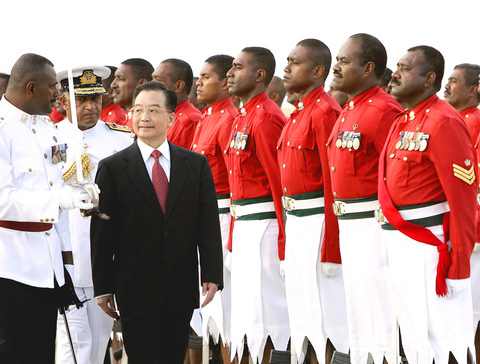Chinese Premier Wen Jiabao (
Wen was greeted by Fijian Prime Minister Laisenia Qarase and an honor guard of Fijian soldiers in traditional white skirts known as a sulu when he arrived in the city of Nadi.
Wen was then driven to a luxury hotel for talks with Qarase and Fijian President Josefa Iloilo.

PHOTO: AP
Today Wen is due to hold talks with other Pacific island leaders whose governments have diplomatic relations with China.
The decision to exclude impoverished South Pacific countries that have relations with Taiwan is the latest round in what experts sometimes refer to as "dollar diplomacy" between Beijing and Taipei.
Susan Windybank, a Pacific expert at the Centre for Independent Studies, an Australian think tank, said China's interest in the region -- which is rich in primary resources but offers no major economic benefits to China -- was focused largely on Taiwan.
"There is no doubt that the increased Chinese activity, which has translated into greater influence, does have a component in trying to combat Taiwanese influence in the region," Windybank said in a telephone interview.
"You could call it a kind of Pacific Cold War between China and Taiwan," she said.
China has diplomatic ties with seven countries in the South Pacific, including Fiji, the Cook Islands, Micronesia, Papua New Guinea, Samoa, Tonga and Vanuatu. It also has ties with the tiny coral atoll of Niue, a self-governing nation administered by New Zealand.
Taiwan in turn is recognized by Kiribati, the Marshall Islands, Nauru, Palau, the Solomon Islands and Tuvalu.
But some of those countries, including Kiribati and Nauru, have switched allegiances several times in recent years in apparent attempts to generate more aid.
Windybank believes the diplomatic volleyball has been damaging to the Pacific.
"They've more or less resorted to bribery via aid to get the allegiance of countries," she said. "That's just exacerbated the problems of corruption in the Pacific and has done very little to help the underlying development problems that urgently need addressing."
But China's interest in the region extends beyond Taiwan, Windybank said.
By securing the allegiance of South Pacific nations, China can effectively create a large voting bloc in the UN and other international organizations where each country is given a vote, regardless of its size, Windybank said.
This would help Beijing to freeze out Taiwan and raise China's influence worldwide.
"It's laying the foundation for a new regional order where Beijing is seen as the natural leader and the United States and its allies are kind of outsiders," she said.
After talks with Qarase, Wen was to sign a number of bilateral agreements promising aid for a hydroelectric power station, as well as promoting cooperation on exports and agriculture.
Today, Wen is scheduled to attend a traditional Fijian welcome ceremony and meet individually with the leaders of Papua New Guinea, Vanuatu, Micronesia, Tonga, the Cook Islands, Niue and Samoa.
He then flies to New Zealand, where he is expected to meet with New Zealand Prime Minister Helen Clark to discuss a free-trade deal between the two countries. He is to wrap up his trip on Saturday in Cambodia.

Indonesia yesterday began enforcing its newly ratified penal code, replacing a Dutch-era criminal law that had governed the country for more than 80 years and marking a major shift in its legal landscape. Since proclaiming independence in 1945, the Southeast Asian country had continued to operate under a colonial framework widely criticized as outdated and misaligned with Indonesia’s social values. Efforts to revise the code stalled for decades as lawmakers debated how to balance human rights, religious norms and local traditions in the world’s most populous Muslim-majority nation. The 345-page Indonesian Penal Code, known as the KUHP, was passed in 2022. It

‘DISRESPECTFUL’: Katie Miller, the wife of Trump’s most influential adviser, drew ire by posting an image of Greenland in the colors of the US flag, captioning it ‘SOON’ US President Donald Trump on Sunday doubled down on his claim that Greenland should become part of the US, despite calls by the Danish prime minister to stop “threatening” the territory. Washington’s military intervention in Venezuela has reignited fears for Greenland, which Trump has repeatedly said he wants to annex, given its strategic location in the arctic. While aboard Air Force One en route to Washington, Trump reiterated the goal. “We need Greenland from the standpoint of national security, and Denmark is not going to be able to do it,” he said in response to a reporter’s question. “We’ll worry about Greenland in

PERILOUS JOURNEY: Over just a matter of days last month, about 1,600 Afghans who were at risk of perishing due to the cold weather were rescued in the mountains Habibullah set off from his home in western Afghanistan determined to find work in Iran, only for the 15-year-old to freeze to death while walking across the mountainous frontier. “He was forced to go, to bring food for the family,” his mother, Mah Jan, said at her mud home in Ghunjan village. “We have no food to eat, we have no clothes to wear. The house in which I live has no electricity, no water. I have no proper window, nothing to burn for heating,” she added, clutching a photograph of her son. Habibullah was one of at least 18 migrants who died

Russia early yesterday bombarded Ukraine, killing two people in the Kyiv region, authorities said on the eve of a diplomatic summit in France. A nationwide siren was issued just after midnight, while Ukraine’s military said air defenses were operating in several places. In the capital, a private medical facility caught fire as a result of the Russian strikes, killing one person and wounding three others, the State Emergency Service of Kyiv said. It released images of rescuers removing people on stretchers from a gutted building. Another pre-dawn attack on the neighboring city of Fastiv killed one man in his 70s, Kyiv Governor Mykola